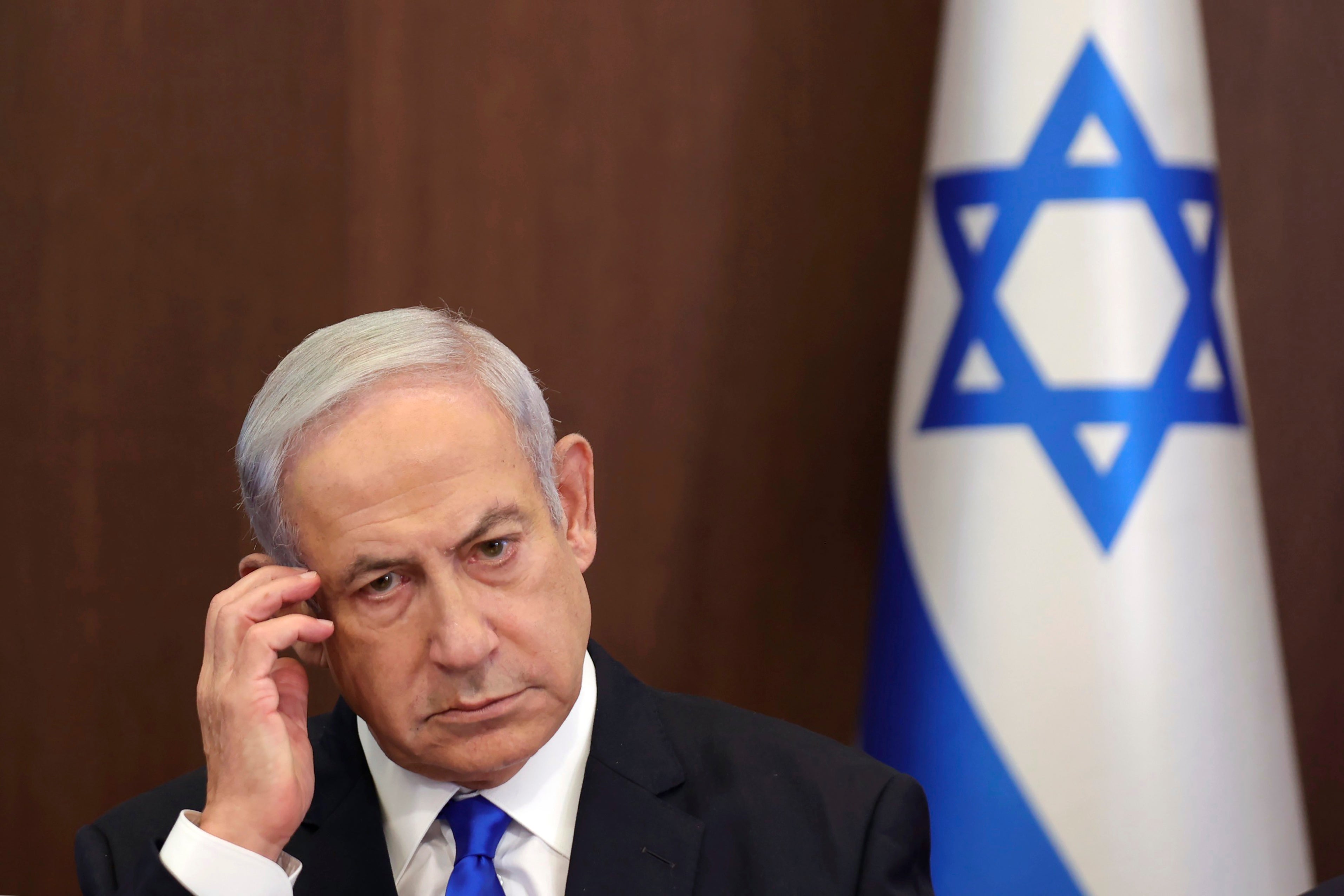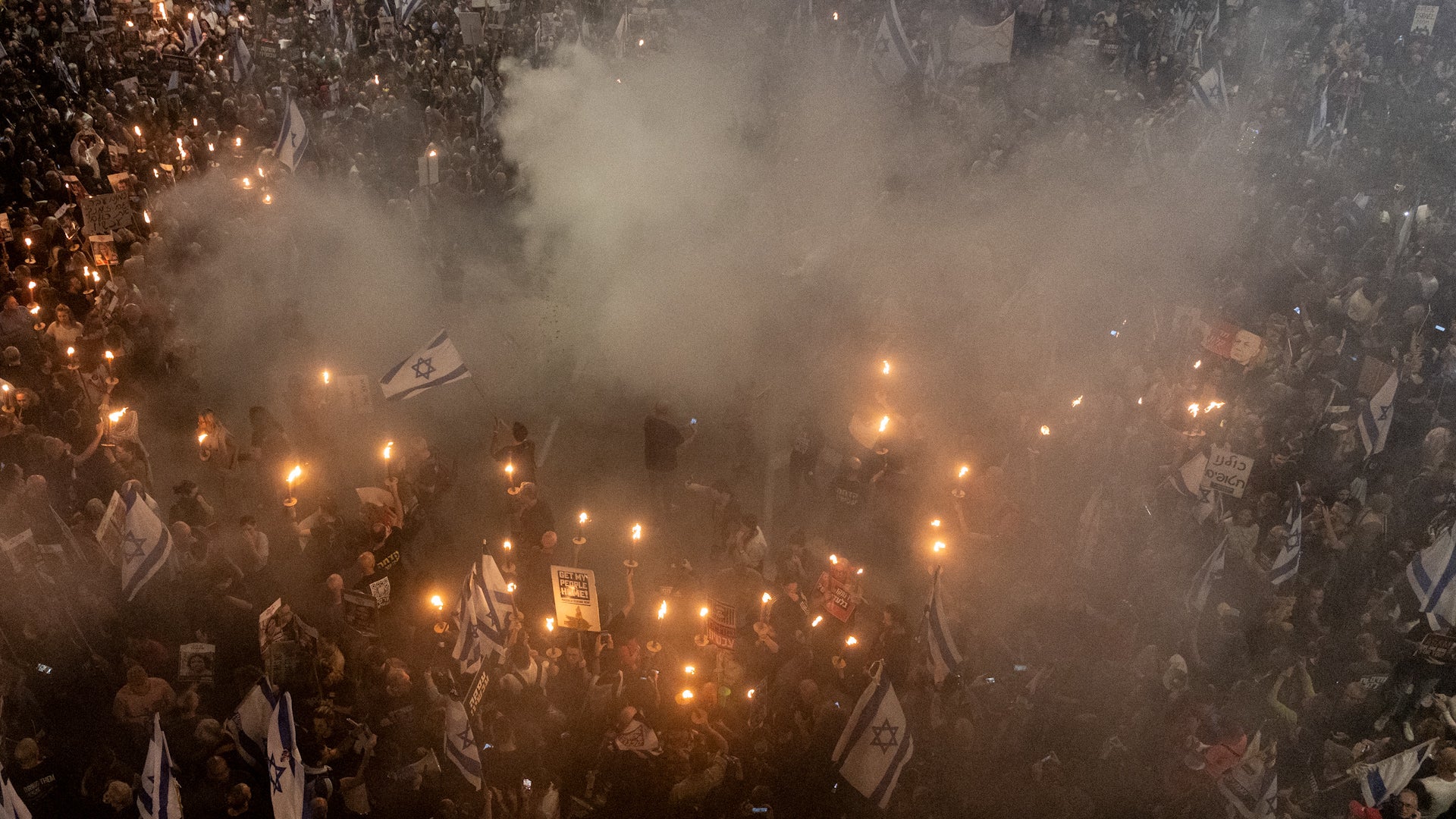Netanyahu says ‘nothing will stop’ offensive on Rafah as Israeli protesters call for his removal
Israeli PM Benjamin Netanyhu made a televised address ahead of undergoing a hernia operation
Benjamin Netanyahu vowed to “destroy” Hamas and press ahead with a ground offensive in Rafah as thousands of protesters called for his removal.
The Israeli prime minister delivered a televised address to the nation on Sunday before undergoing hernia surgery, saying he would do “everything” he could to secure the release of hostages abducted by Hamas.
Mr Netanyahu said his army would move civilians from Rafah before launching an offensive on the southern city.
“Nothing will stop us, once we do that [evacuate civilians], not American pressure and nothing else,” he said. “If we do not destroy those battalions of Hamas there we cannot actually win because otherwise it is an existential threat against the state of Israel.”
Several of Israel’s allies and humanitarian groups have warned that a ground offensive in Rafah, on the border with Egypt, would result in a human catastrophe.
And on Sunday, protesters gathered in Jerusalem to urge the government to reach a deal to free dozens of hostages held by Hamas in Gaza and to hold early elections.
Nearly six months of war have renewed divisions in Israeli society about how to respond to the ongoing hostage situation.
Hamas killed some 1,100 people during its cross-border attack on 7 October and took about 250 others hostage. More than 32,000 people have been killed in Gaza by the Israel Defense Forces according to the health ministry in the strip, with the majority of victims being women and children.

Roughly half the hostages were released during a weeklong ceasefire in November, but repeated attempts by international mediators to broker another ceasefire deal have so far failed.
“After six months, it seems like the government understands that Bibi Netanyahu is an obstacle,” said demonstrator Einav Moses, whose father-in-law, Gadi Moses, is held hostage.
“Like he doesn’t really want to bring them back, that they have failed in this mission.”
The crowd of protesters stretched for blocks around the Knesset, or parliament building, and organisers vowed to continue the demonstration for several days.
They urged the government to cancel an upcoming parliamentary recess and to hold new elections nearly two years ahead of schedule.

In his address, Mr Netanyahu also said he understood the pain of the hostages’ families. “I will do everything to bring the hostages home,” he said.
He also said calling new elections – in what he described as a moment before victory – would paralyse Israel for six to eight months and would freeze the hostage talks.
Also on Sunday, an Israeli airstrike hit a tent camp in the courtyard of a crowded hospital in central Gaza, killing two Palestinians and wounding another 15, including journalists working nearby.
An Associated Press reporter filmed the strike and aftermath at Al-Aqsa Martyrs Hospital in Deir al-Balah, where thousands of people have sheltered.
The Israeli military said it struck a command centre of the Islamic Jihad militant group.
Tens of thousands of people have sought shelter in Gaza’s hospitals, viewing them as relatively safe from airstrikes.
Israel accuses Hamas and other militants of operating in and around medical facilities, which Gaza’s health officials deny.
Israeli troops have been raiding Shifa Hospital, Gaza’s largest, for nearly two weeks and say it has killed scores of fighters, including senior Hamas operatives.
Only a third of Gaza’s hospitals are even partially functioning, while Israeli strikes kill and wound scores of people every day.
Doctors say they are often forced to operate without anaesthetic and other crucial supplies.
Join our commenting forum
Join thought-provoking conversations, follow other Independent readers and see their replies
Comments
Bookmark popover
Removed from bookmarks